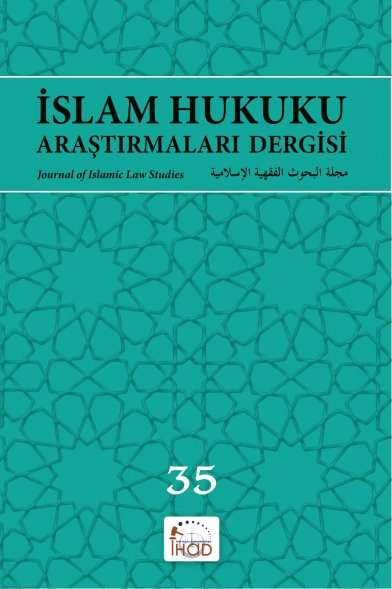İstishâb (Serahsi Özelinde Usûl-Füru’ Karşılaştırması)
İstishâb, genel manada geçmişte mevcut olan bir hükmün, aksine hukuki bir delil bulunmadıkça varlığını devam ettirmesi olarak tanımlanır. Hukuki olarak delil olma niteliği tartışmalıdır. Mahiyeti ve deliller sıralamasında nerede yer aldığı konularında farklı değerlendirmeler olmuştur. Hanefi doktrininde genel kabul gördüğü şekil, var olan hükmü muhafazaya yöneliktir. Yeni hakların edinilmesinde olumlu katkısı yoktur. Bunun için yeni ve farklı delillere ihtiyaç vardır. Hanefi hukukçu Serahsî’nin de bakışının aynı olduğunu görüyoruz. Serahsî, konuyu dört başlıkta ele alır. Ona göre değişikliğin olmadığı kesin ise, istishâb geçerlidir. İslâm hukuk tarihinde istishâb delilinden kaynaklanan önemli genel kurallar oluşmuştur. Kavaid-i külliye tabir edilen bu prensiplerin de istishâb uygulamasında geniş kapsamlı etkileri olmuştur.
Anahtar Kelimeler:
Delil, Dava, Kavaid-i Külliye, İçtihat, Hüküm
Istishab (The Comparison of the Fundamentals and the Derivatives (Usûl-Furû) in the Context of Sarahsî’s Legal Discourse)
Istishab is generally defined as the continued validity of a jurıdical verdict that was rendered in the past, unless there is a legal proof contrary to it. Its acceptance as a proof is debatable from the perspective of Islamic law. There have been various considerations among jurists with regard to its status and place in the hierarchy of proofs. The way it is accepted in the Hanafi legal school is mainly for maintaining the existing legal verdict. It has no positive role in the acquisition of new rights. There is a need, therefore, for new and different proofs. We find Sarahsî, a Hanafi jurist, looking at this matter from the same angle. He takes up this subject under four headings. In his view, istishab is valid if there is no change at all. In the history of Islamic jurisprudence there have been significant universal rules derived from the proof of istishab. These universal principles, known as al-qawâ’id al-kulliyya, have been effective in the application of the istishab.
Keywords:
Proof, Litigation, Universal Principles, Individual Judgment, Ruling,
- ISSN: 1304-1045
- Yayın Aralığı: Yılda 2 Sayı
- Başlangıç: 2004
- Yayıncı: Gençleri Evlendirme ve Mehir Vakfı
Sayıdaki Diğer Makaleler
İslam İktisadında Bir Finans Kaynağı/Aracı Olarak Ortaklık
Hz. Eyyûb Kıssasının Fıkhî Yansımaları
Şâtıbî’de Mertebetü’l-Afv Kavramı: Beş Teklifi Hüküm Dışında Kalan Durumlar ve Mubah İle İlişkisi
Klasik İcma Teorisine Modern Yaklaşımlar: Fazlurrahman Örneği
Mütûn-ı Erbaa’da İmam Muhammed’in Görüşlerine Atıflar (İbadetler Bölümü Örneği)
İstishâb (Serahsi Özelinde Usûl-Füru’ Karşılaştırması)
Altın ve Gümüşün Kendi Cinsi İle Mübadelesinde Kalite Ve İşçilik Farkı Meselesi
